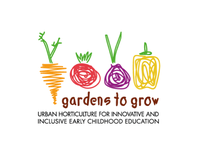
Sector: School
Unibo structure involved: Department of Agricultural Sciences
Unibo Team: Nicola Michelon, Giuseppina Pennisi, Giorgio Prosdocimi Gianquinto
Website: http://www.gardenstogrow.eu/
Project Duration in months: 30
Start Date: 01/09/2017
End Date: 29/02/2020
Budget: euro 374.165,00
Unibo Budget: euro 36.025,00
Coordinator: MUSEO DEI BAMBINI SOCIETA COOPERATIVA SOCIALE ONLUS (IT)
Partners:
- ALMA MATER STUDIORUM - UNIVERSITA DI BOLOGNA (IT)
- UNIVERSITA DEGLI STUDI DI PARMA (IT)
- STEPS srl (IT)
- ISTITUTO COMPRENSIVO CLAUDIO ABBADO (IT)
- MUZEIKO FOUNDATION(BU)
- Cosmos Kids 1 LTD (BU)
- SOUTH WEST COLLEGE (UK)
- Dungannon Primary School (UK)
- FUNDACIÓN TIERRA INTEGRAL(ES)
- ESCUELA DE EDUCACION INFANTIL N1 DE BULLAS (ES)
Description:
Increasing quality and equity of ECEC services is a priority for all EU countries and can make a strong contribution, through enabling and empowering all children to realise their potential. Urban Horticulture has proved to be a powerful tool for education, socialisation and inclusion and for improving the sense of belonging to the community.
GARDENStoGROW aims to provide ECEC teachers with an innovative teaching methodology, tools and materials for fostering inclusive attitudes and key competences acquisition from a very early stage of child development (0-6) through horticulture.
This is made possible thanks to a balanced, transnational and complementary cooperation between: pre-primary and primary schools, children’s/science museums/STEM centres, HEIs and local educational authorities.
The idea is that museums’ gardens, with an active support and inputs from schools, other partners and local stakeholders, can become permanent and living “learning places” for local schools, pupils, children and families, where they can meet and learn from each other.
The project lasts 30 months and is composed of 11 partners, ECEC schools, children’s museums/STEM Centers, HEIs from Italy, the UK, Spain and Bulgaria, working together for the development of 4 IOs:
- IO1 GARDENStoGROW Inventory: a comparative analysis of inclusive gardening practices and activities from Italy, the UK, Spain and Bulgaria, to identify skills and competences needed by teachers and ECEC professionals for inclusive and affordable gardening and ways of cooperation between schools and society;
- IO2 GARDENStoGROW Methodology Guidelines: a definition of common guidelines relating to garden design structure, inclusive pedagogical practices and the model and structure of the international training course;
- IO3 GARDENStoGROW Educational Materials & Training course: the core of the project, the development of materials and trainings, to foster the adoption of innovative and inclusive ECEC practices based on urban and social horticulture, through 2 training events, a pilot blended course and the creation of the gardens in each country;
- IO4 Learning, Affordable, Inclusive and Open Gardens for Innovative ECEC practices: a set of recommendations to encourage the adoption of the most innovative and inclusive ECEC practices based on urban and social horticulture and on the active cooperation among the world of schools and society.
IOs are disseminated through 4 multiplier events, 2 national and 2 transnational, while the whole project is built on management and implementation strategies, including communication, dissemination and evaluation, with 4 transnational meetings.
GARDENStoGROW applies a participatory approach and collaborative reflection methodology to involve 1,800 participants in the activities and results: ECEC teachers and school leaders, teacher trainers and educators, personnel of children’s/Science Museums/STEM Centers and other ECEC teacher training providers; HEIs researchers and students, civil society organisations, pupils and families.
Participants (mainly school teachers, teacher trainers, educators and experts) will be involved in 2 joint training staff events, while a pilot blended international course based on the project will be open also to other teachers, inside and outside the partnership.
Besides the Intellectual Outputs, the project results include: a project website and social pages, an international network of Open, Affordable, Learning and Inclusive Gardens including pilot gardens and further gardens created according to the project guidelines, recommendations for recognition of competences acquired through participation in the pilot course based on the EQF, Guidelines for identification and involvement of disadvantaged schools in the pilot gardens.
On a longer term, the project will impact on the quality of the ECEC sector by:
- offering teachers and pupils aged 0-6 the opportunity to enrich their curriculum and competences based on a non formal and hands-on approach and an innovative tool for social inclusion or marginalised pupils;
- improving the capacities of schools of operating in partnerships with key local actors, including children’s and science museums, STEM centres, foundations and research centres/universities;
- evaluating in a long term perspective the efficacy and role of extra-curricular hands-on workshops based urban and social horticulture;
- reinforcing cooperation between practice, research and policy.
Thanks to GARDENStoGROW pupils and families, including those at risk of marginalisation, will benefit for better ECEC services, innovative pedagogical activities with motivated teachers. They will find in the pilot gardens a place for socialisation and inclusion and more opportunities for learning and experiencing direct contact with nature.

